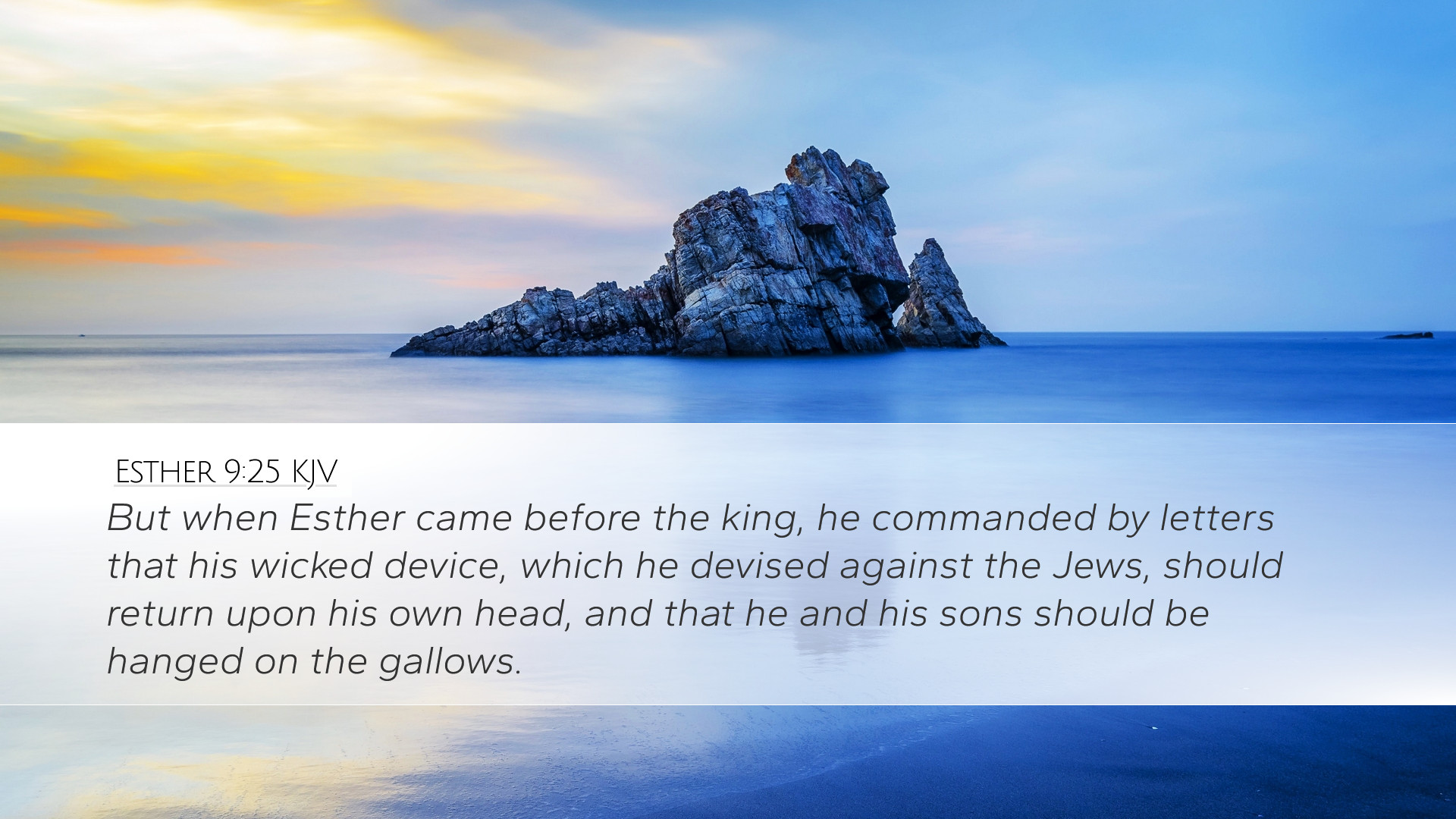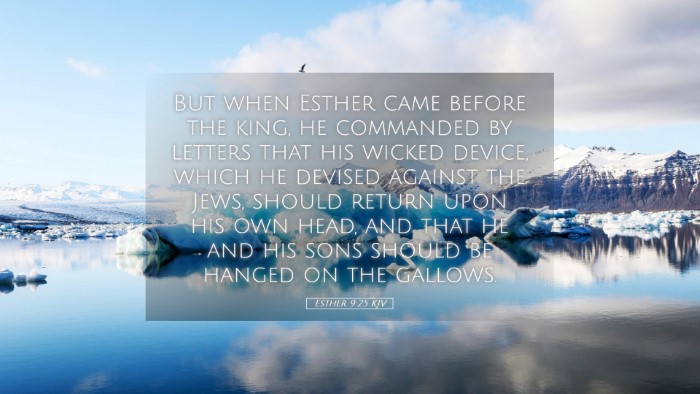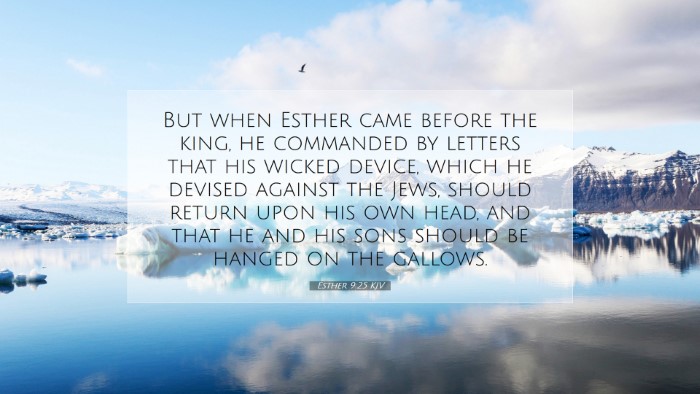Commentary on Esther 9:25
Bible Verse: "But when Esther came before the king, he commanded by letters that his wicked device, which he devised against the Jews, should return upon his own head, and that he and his sons should be hanged."
Introduction
Esther 9:25 marks a significant moment in the narrative of Esther, illustrating the reversal of fortune for God's people and the fulfillment of divine justice against the adversaries of Israel. This verse serves as a culmination of the themes of providence, justice, and vindication. In this commentary, we synthesize insights from prominent public domain commentaries, including those by Matthew Henry, Albert Barnes, and Adam Clarke, to explore the theological implications and practical applications of this passage.
The Context of Esther 9:25
To fully grasp the weight of Esther 9:25, it is essential to consider the broader context of the Book of Esther. This book chronicles the story of God's sovereignty amidst exile, highlighting the plight of the Jews and their deliverance through Queen Esther's courageous actions. Esther's approach to King Ahasuerus to plead for her people sets the stage for the dramatic reversal depicted in this verse.
Insights from Commentators
Matthew Henry's Perspective
Matthew Henry emphasizes the role of divine providence in the events leading to Haman's downfall. He notes:
- Divine Justice: Henry underscores that Haman's plans to destroy the Jews ultimately backfire, demonstrating the principle that those who conspire against God's people will face judgment. The proclamation from the king signifies not just the protection of the Jews, but also a direct consequence for Haman's wickedness.
- The Reversal of Fortune: This verse encapsulates the great reversal theme prevalent throughout the Book of Esther. Henry points out that God’s hand is evident, leading to Haman's demise while simultaneously promoting Esther and Mordecai's status.
Albert Barnes' Interpretation
Albert Barnes provides a detailed exposition on the implications of Esther 9:25, highlighting several key themes:
- The Role of Prayer: Barnes notes that Esther's intercession before the king symbolizes the power of prayer and the importance of seeking divine intervention in times of distress. This act of boldness is pivotal to the unfolding narrative and serves as an encouragement for believers to rely on God in times of trouble.
- Manipulation of Justice: Haman’s death by the gallows he prepared for the Jews serves as a sobering reminder of the manipulation of justice. Barnes points out that God often allows the wicked to flounder in their schemes, bringing their own plans to ruin, which teaches believers about the importance of moral integrity.
Adam Clarke's Commentary
Adam Clarke offers a theological reflection on Esther 9:25, emphasizing the following aspects:
- The Nature of Human Depravity: Clarke discusses how Haman's intrinsic evil led him to conceive a plot so vile against the Jews. His downfall serves as a stark contrast to the moral order that God upholds. Clarke asserts that this allows readers to see the ultimate triumph of good over evil.
- Historical Context: Clarke provides a historical viewpoint on the significance of the gallows as a means of execution in Persian society, noting that it was a public demonstration of disgrace. This backdrop underscores Haman's shame and the public acknowledgment of Esther and Mordecai's righteous cause.
Theological Implications
Esther 9:25 serves as a powerful reminder of the following theological truths:
- God’s Sovereignty: The verse is a testament to God's sovereignty in human affairs, showcasing how He orchestrates events for the good of His people. The principle that our prayers and actions can influence the outcomes is at the center of this narrative.
- Justice and Retribution: The reversal of Haman's plot emphasizes the biblical understanding of justice, where evil deeds ultimately result in the downfall of the wicked.
- Encouragement to the Faithful: For believers, this passage serves as a source of encouragement, affirming that God will defend the oppressed and ensure that justice prevails in the end.
Practical Applications
The implications of Esther 9:25 extend beyond its historical context, offering valuable lessons for today's believers:
- Courageous Advocacy: Esther's example encourages individuals to advocate for justice and defend the rights of the oppressed. In a world where injustice prevails, being a voice for the marginalized is a call to action.
- Trust in Divine Providence: Believers are reminded to trust in God’s timing and sovereignty. Even when circumstances appear dire, faith in God's ultimate plan can provide peace and hope.
- Reflection on Our Actions: The narrative prompts self-reflection regarding our intentions and actions towards others. It challenges believers to consider how their choices align with God’s moral order.
Conclusion
Esther 9:25 encapsulates the core themes of the Book of Esther, weaving together the threads of providence, justice, and the vindication of God’s people. The insights drawn from the commentaries of Matthew Henry, Albert Barnes, and Adam Clarke illuminate the significance of this passage for contemporary believers. It challenges pastors, students, theologians, and Bible scholars to embrace the courage exhibited by Esther and to trust in God’s ability to bring about justice. May we be inspired to live out our faith boldly, confident in the assurance that God works all things together for the good of those who love Him.


